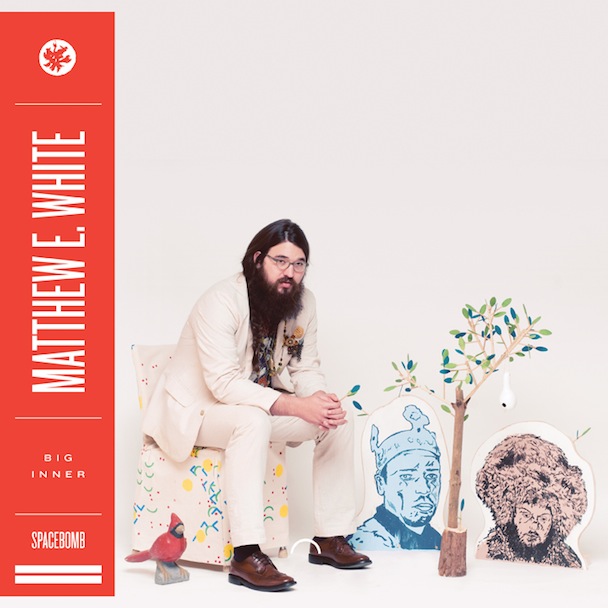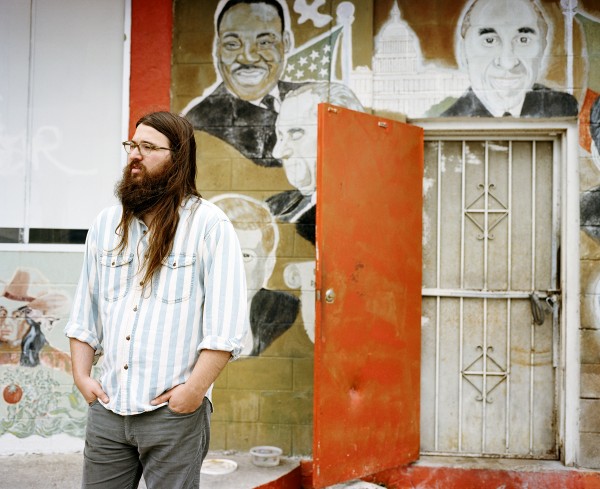Virginia-based psychedelic-soul artist Matthew E. White comes to Asheville with The Mountain Goats on Friday, Nov. 30 (they play The Grey Eagle at 9 p.m. $18 in advance or $20 day of show). It’s White’s first time in Asheville representing a solo project, though it’s not his first time in Asheville, as he explains to Xpress. He also talks about his mutually beneficial relationship with the Mountain Goats, the surprising response to his debut, Big Inner, and his approach to dynamics in music.
Mountain Xpress: Will this be the first time you’ve played Asheville?
Matthew E. White: As myself, yeah. I came with a band called The Great White Jenkins a few years ago. It was a fortunate meeting, because I played a show at the record store, at Harvest, and it was with Megafaun. That’s been a very influential relationship in my life. So I hold Asheville in high regard. Not to mention that I used to party with Mark and Matt [of Harvest Records] in college, and now they’re hot-shot records store owners. We’re all from Virginia.
How did you connect with Mountain Goats?
Well, actually, to bring it back to Asheville, I met Megafaun at that show at the record store and we developed a special relationship. They had an opportunity to curate an event at Duke University and they asked me to come on with another band called Fight the Big Bull, which is a bunch of horns. We did this event with Megafaun and me and Justin Vernon [aka Bon Iver] and Sharon Van Etten at Duke. It was called Sounds of the South, a big to do.
John Darnielle [of the Mountain Goats] was there and heard it and liked the way I wrote for the horns. So when it came time for him to do his next record, he gave me a call and asked me to do the horn arrangements on Transcendental Youth. I did those and it just so happened that our records came out at the same time. It wasn’t planned at all. I was looking for a good opening slot and he was looking for some horn players, so it works out really well. We get to travel together and he uses the horn players from my band who actually played on Transcendental Youth. It’s a cool relationship, I’ve really learned a lot from that guy.
I think that what you did with the horns on that album added this lightness and brightness. The horns change it.
Well good! I hope that’s what they wanted.
Big Inner is getting some great response, too. Were you surprised by the reaction?
Yes. Totally. Big Inner was made as a demo. That’s a bit light of a word, but it was made to be an introduction to a record label, not to necessarily stand on its own. It was meant to show a process and really, more than that, go through a process on my own. When I made it, I was going to press 500 copies on my laptop. It was going to be DIY all the way. Along the way, some people heard it and said, “Man, you can’t do that to yourself. You’ve got to get this in front of people.” There’s some people who have come on board and made this a reality.
By the time the record release came along I had an idea that this was maybe better than I thought it was, or was striking people in a unique way at least. But then, I’ve been ecstatic about all the energy it’s gotten. This is new. This is new stuff for me and it’s exciting.

That says something about you. If to you that felt like just an introduction, I wonder what you could do if you were really trying to go all out. But does that feel like a lot of pressure?
I know, right? Exactly! People have been like, “Holy shit, dude! What can you do if you have a little bit more resources?” That’s just my responsibility to deal with. For me, if I have the opportunity to make a record with a little bit more time and a little bit more resources, I can put that in service of the music. I’m not running short on ideas about how to make the music better or make the process better. I feel lucky to be in this position. Moving forward, I feel lucky to be in any position making music for a living or for a partial living.
It’s about the music and chipping away at a craft. I’m happy for the press, but it doesn’t really drive the creativity. That’s what’s nice about having success based on this record. It’s not just that people are willing to have me work on some stuff, but that they want me. That’s what I want, as a musician. For people to to hire me because I’m Matthew E. White. Not because I’m a guitar player or a horn arranger or I work for cheap or whatever. They want what I make, and that’s what’s cool about the record is it’s what I made on my own, in my own little bubble, with my friends.
I feel like the album taps a sort of spiritual connection. Not necessarily religion. But your music does get described as “psychedelic soul.” Do you feel a connection to something higher?
I think music is this funny thing. What is it? It’s a strange, natural thing but it doesn’t exist for a reason in an evolutionary sense. It’s here and it’s beautiful and it affects people in amazing ways. It’s really an amazing vessel for all of our human energy. That sounds really far out. It’s this crazy, beautiful thing and I try to do it justice. I’m lucky enough to have a proclivity to work with it, to be able to shift it around and make something of it. If anything comes across that I’m aware of, it’s just a service to this art form that human kind has been obsessed with for as long as we know. [I’m] trying to let the music out of people.
Sometimes in the culture, now, it becomes so much about who the artist is. Who are they? Who is that person? What are they like? What do they talk like? What’s their background? You know, stuff. It’s a cult of personality thing. And the music can take that on, where it’s more of a cultural statement than of a musical statement. That’s fine, I don’t have a problem with that. But for me, sometimes when I’m listening, I just want to hear good players play good music and good writers write good music. That comes together along side emotion and a passion for something (whether it’s a relationship or someone’s passing or religion or whatever) to make something very human. To make a really nice example of what our human existence can be. Because sometimes life sucks and music is a really awesome way — a moment we can live and listen to that represents stuff over and over again that doesn’t totally suck. It’s something people can come back to. I can listen to a song over and over again. Maybe it’s the representation of the way I wish the world was more often.
I’m fascinated by the way you approach dynamics. Instead of working with loud and soft, you work with layers.
I can give a practical reason. In the olden days, when you didn’t have volume knobs, that is how you increased your volume. String players can play a certain dynamic, a certain kind of loudness. If you want it to be really loud, you need to add some trumpets to that. If you want it to be louder, you need to add some drums. If you want it to be louder than that, you need to add a choir or something. That’s just how orchestral music works. Or acoustic music, though that term means a different thing now.
When I say acoustic, people think banjos and shit. But my record really is acoustic. The only thing amplified on the record is my guitar and the electric bass. Other than that, everything is acoustic, And my guitar certainly isn’t wailing guitar by any means. So, to actually achieve dynamic when you aren’t dealing with electric instruments is to utilize layers in a creative way. Just from a practical element.
“Will You Love Me” starts with drums and bass and my vocal and piano. At the end it’s loud, but the reason it’s loud is because the drums and bass are physically hitting their instruments harder. The trumpets are in their high register and the violins are in their high register. You achieve that sense of max by combining instruments into one big voice. That’s a very physical thing and that’s something I miss from a lot of albums I listen to now. There’s a difference, even at the decibel level, from turning up an electric guitar to 100 decibels [versus] 40 musicians playing something that’s 100 decibels. There’s a weight and physical heaviness that comes from that that I like. I like to feel that. I like a punch-in-the-stomach volume rather than an in-my-ears-volume.
And I think I’m influenced by a lot of music that kind of does that. That has a few different things going on at the same time. Certainly jazz music is that way. There’s a few different narratives at the same time. I don’t listen to very much music that’s guitar and vocal. That’s not the library I’m pulling from in my brain, so that’s not what comes out.

Photo from Consequence of Sound
One more question: What do you think will happen on Dec. 21?
Dec. 21? What’s that?
It’s the end of the world, according to the Mayan calendar.
Cool. On Dec. 21 I’m going to be playing a show in Salt Lake City. I can’t think of a better place to be. It’s a wild place. I don’t know, but if I get a vote, I vote for sticking around. I don’t have any interest in the world ending quite yet.




Before you comment
The comments section is here to provide a platform for civil dialogue on the issues we face together as a local community. Xpress is committed to offering this platform for all voices, but when the tone of the discussion gets nasty or strays off topic, we believe many people choose not to participate. Xpress editors are determined to moderate comments to ensure a constructive interchange is maintained. All comments judged not to be in keeping with the spirit of civil discourse will be removed and repeat violators will be banned. See here for our terms of service. Thank you for being part of this effort to promote respectful discussion.